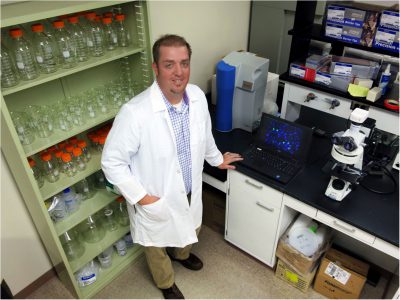
The Matilda R. Wilson Chair in Large Animal Clinical Sciences is endowed by a gift from the estate of the late Matilda R. Wilson as a means of continuing her keen interest in the wellbeing of food animals and horses.
Adam Moeser was named the second Matilda Wilson Chair in 2015. He directs the Gastrointestinal Stress Biology Laboratory in the MSU College of Veterinary Medicine's Department of Large Animal Clinical Sciences.
Moeser is an important leader in new understandings regarding the influence of early-life environmental factors, such as stress and diet on intestinal disorders including irritable bowel syndrome and inflammatory bowel disease.
The Laboratory's objective is to gain a fundamental understanding of the biological mechanisms by which stress impacts the development and clinical severity of important gastrointestinal diseases. The ultimate goal is to uncover novel therapeutic targets and identify alternative practices to prevent or treat these economically devastating diseases.
Moeser came to MSU from North Carolina State University’s College of Veterinary Medicine, where he established a research program of national and international stature. As an associate professor of gastrointestinal biology and swine medicine in the Department of Population Health and Pathobiology, he was a full member of the Comparative Biomedical Sciences graduate program and an active member of the immunology core graduate training program. Moeser earned his MS in animal science, PhD in physiology, and DVM from North Carolina State University, Raleigh.
Widely published, Moeser is the recipient of numerous honors including a Young Investigator Award from the American Gastroenterological Association and the Research Recognition Award from the American Physiological Society. He has received several teaching awards and served on national and international grant review panels including the National Institutes of Health; the Canine Health Foundation; the Ontario Ministry of Agriculture, Food and Rural Affairs; and the National Pork Board.
He has been an invited speaker at a wide range of international venues, including pharmaceutical companies, national and international scientific meetings, veterinary colleges, and medical schools including the University of California, Los Angeles and the University of North Carolina, Chapel Hill. His work has been supported by the National Institutes of Health, the United States Department of Agriculture, and industry partners.
